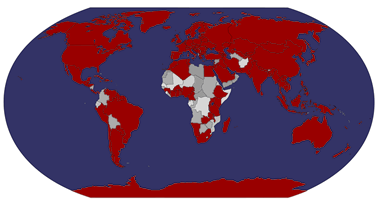A lovely map card of Cape Verde I received from Eileen a couple of years ago. It must be a pretty amazing holiday destination... I certainly wouldn't mind being somewhere warm like that at the moment - I've got a bit of a cold at the moment which is no fun at all, and the cold, wet weather certainly isn't helping. :/
Cape Verde, officially the Republic of Cabo Verde, is an island country spanning an archipelago of 10 volcanic islands in the central Atlantic Ocean. Located 570 kilometres off the coast of Western Africa, the islands cover a combined area of slightly over 4,000 square kilometres.
Portuguese explorers discovered and colonized the uninhabited islands in the 15th century, the first European settlement in the tropics. Ideally located for the Atlantic slave trade, the islands grew prosperous and often attracted privateers and pirates, among them Sir Francis Drake in the 1580s. The islands were also visited by Charles Darwin during FitzRoy's Beagle voyage in 1832. The islands were settled as the colony grew in importance on the main shipping lanes from Europe to India and Australia, and population increased steadily.
At the time of independence from Portugal in 1975, Cape Verdeans emigrated across the world, such that the population in the 21st century of over half a million people on the islands is equaled by the diaspora in Europe, the Americas, and on the African continent. The Cape Verdean economy is mostly service-oriented with a growing focus on tourism and foreign investment.
The country is known for the Cape Verdean type hurricanes that form off the coast of the archipelago islands. While many move harmlessly out to sea, some move across the Caribbean sea and Gulf of Mexico, becoming damaging storms for Caribbean nations, Central America, Mexico, Bermuda, the United States, and occasionally even Canada.
Subscribe to:
Post Comments (Atom)





 Maroon
Maroon 










































































































































































No comments:
Post a Comment